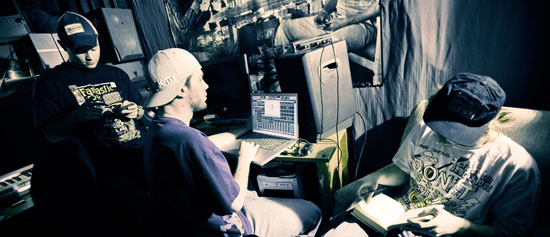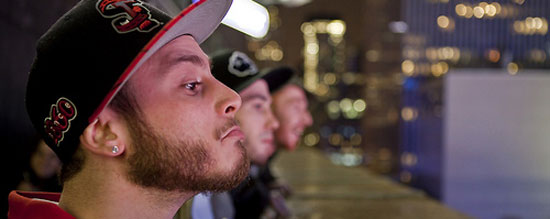The Higher Concept: “Life’s Good” Part One
Posted by Justin Boland on Jun 10, 2010 | 0 Comments

When I first met The Higher Concept, the entire state of New York was under three feet of snow…and rising. I was taking a Greyhound to a gig in Buffalo in late 2007. It had been snowing for a day already, and when I got off at the Syracuse station, a fat elderly cop cheerfully told us that all busses were cancelled for the day. I called the promoter to let him know, and he was curiously not all that concerned. “Oh, that’s probably no biggie. Let me call you right back.” I couldn’t tell if he was going to help me, or just casually stomping on my ego’s nuts, but then he did in fact call back. It turned out The Higher Concept were still driving from Albany and they were willing to swing through and give me a ride.
Today, that gig in Buffalo stands as one of my all-time favorite onstage experiences. It was a formative night in terms of letting me know I was not insane to think about rapping for a living. It was also a great night because hot damn, The Higher Concept put on a crazy live show. It was immediately obvious they’d been paying dues for many years and honing every single aspect of what they presented. With an approach like that, it’s no surprise that they’ve gotten even better in the years since then, evolving into a full live band and releasing their latest album, “Life’s Good.” (Which happens to be full of awesome summer jam party people positive hip hop tracks-check it out.)
For the first part of this interview, we’re talking about building a better live show, their creative process/lifestyle, and the business of hip hop…
Audible Hype: What do you think are the biggest barriers to entry for new hip hop artists?
 Matty J: Nowadays, the biggest barrier to entry for a hip hop artist is being unique. Every catergory and sub-category of artist has been done over and over. As soon as you try to explain yourself in any of the terms that are commonly used, you are instantly narrowing yourself. “Rapper” has a horrible connotation in many circles, and I even shy away from THAT term when describing what I do and what THC does. I prefer to just let the music speak for itself and let the listener try to describe it. Which brings me to the next barrier to entry: Getting people to pull the trigger and GET your music. This is is difficult even when your product is FREE.
Matty J: Nowadays, the biggest barrier to entry for a hip hop artist is being unique. Every catergory and sub-category of artist has been done over and over. As soon as you try to explain yourself in any of the terms that are commonly used, you are instantly narrowing yourself. “Rapper” has a horrible connotation in many circles, and I even shy away from THAT term when describing what I do and what THC does. I prefer to just let the music speak for itself and let the listener try to describe it. Which brings me to the next barrier to entry: Getting people to pull the trigger and GET your music. This is is difficult even when your product is FREE.
Marketing scheme after marketing scheme has made everyone weary that they are somehow being swindled into listening to a song “against their will”. I feel that way as a music listener and consumer sometimes, so I get it. But I still don’t have a solution. We try our best to stand out and provide some type of benefit to the consumer above and beyond just getting the music. This may include making the creative process interactive, (as we did with our album cover for “Life’s Good” where we had the fans choose what the cover would be from three options) or being an early mover on a new pop culture item (as we did with our remix of the HBO series “How To Make It In America“‘s theme song, where we released of an mp3 and music video within a week of the announcement that the show was picked up for a second season). We want to offer more than just music, and I think it shows.
 IB: I think the biggest barriers for new hip hop artists are a lack of connections. At this point in our career, we have realized the truth behind the cliche “it’s not what you know it’s who you know.” Every big break we’ve gotten so far has been through forming personal connections and long term relationships with the right people who were in the right places. The music obviously has to speak for itself and having a great product that you are confident is always a great start in starting these relationships, but you have to realize how many millions of people are out there with ‘exceptional’ music. The music only takes you so far.
IB: I think the biggest barriers for new hip hop artists are a lack of connections. At this point in our career, we have realized the truth behind the cliche “it’s not what you know it’s who you know.” Every big break we’ve gotten so far has been through forming personal connections and long term relationships with the right people who were in the right places. The music obviously has to speak for itself and having a great product that you are confident is always a great start in starting these relationships, but you have to realize how many millions of people are out there with ‘exceptional’ music. The music only takes you so far.
On top of that, I think that the pop music formula has been thoroughly defined. It is very hard to break out of this formula and bring something new to an America so set in its ways. I must say that I have been enjoying watching the trends in hip hop this past year and I’m starting to think that I might actually be pleased with the direction it is heading in, and that is an idea that I haven’t been able to consider since I became a fan of this music.
 Tekst: There is no barrier, to me, if you are making hip hop music you are “in it”. If the question is ‘what are the barriers to gaining exposure for new hip hop artists,’ then shit, everything. To me, the “game” or “industry” is a giant popularity contest. It’s not even about whose music can make it further these days, its about what artist is seen more or mentioned more. If we aren’t visible, it doesn’t really matter how great our music is…and one of the biggest barriers is being visible. With the myspace fad, lots of people were able to make a career as artists cuz for a while just the music was enough, and if you found your niche online that supported you enough, it could elevate you career to the next level. Nowadays, everyone is a singer/rapper/artist and everyone has a myspace page, which is why the interest in it has declined. Now poeple want to SEE the artist. Who is making quality videos, who is performing at popular shows, showcases, festivals. Before the barrier was just getting your music made and having it sound as quality as the next artist, but now its about having a video that looks as good. If you cant get a good video made, chances are, your songs wont make it to a lot of the biggest music websites, because they all play video now and rarely just stream music.
Tekst: There is no barrier, to me, if you are making hip hop music you are “in it”. If the question is ‘what are the barriers to gaining exposure for new hip hop artists,’ then shit, everything. To me, the “game” or “industry” is a giant popularity contest. It’s not even about whose music can make it further these days, its about what artist is seen more or mentioned more. If we aren’t visible, it doesn’t really matter how great our music is…and one of the biggest barriers is being visible. With the myspace fad, lots of people were able to make a career as artists cuz for a while just the music was enough, and if you found your niche online that supported you enough, it could elevate you career to the next level. Nowadays, everyone is a singer/rapper/artist and everyone has a myspace page, which is why the interest in it has declined. Now poeple want to SEE the artist. Who is making quality videos, who is performing at popular shows, showcases, festivals. Before the barrier was just getting your music made and having it sound as quality as the next artist, but now its about having a video that looks as good. If you cant get a good video made, chances are, your songs wont make it to a lot of the biggest music websites, because they all play video now and rarely just stream music.
So to me, I guess all that comes down to money. If you’ve got money to be competitive and make yourself look good, you got a much better shot of succeeding then the artist that doesn’t have any at his disposal. This doesn’t mean that just cuz there’s money involved, a person will blow up, but to me…it’s very very rare to see an upcoming group make it solely on the music and gigs and word of mouth anymore. Major labels arent singing artists based on their sound, or a belief that they can be a big artist, they are signing them based on stats of youtube hits, and blog posts and seeing who is ALREADY popular. Unfortunately, I feel like if the person has the right budget and proper marketing plan, they can instantly become a name in the industry. But then what? What obstacles and other bullshit do they gotta go through once they get there on those terms? THC has tried our best to remain true to our sound and just do what we enjoy and feel. and aren’t really seeking out the huge dollars to elevate our careers. We still believe that with persistance, our music will be what gets us some recognition, not a tricked out video, or high budget image. Maybe this is why we arent further along with our careers, but to us, the sacrifice would never be worth it. Basically we dont mind the barrier, we know it’s there but dont care to alter our sound or image to get over it. We love what we do and when fans respond to us, we know we are going in the right direction, even if it is taking longer than other artists.

Audible Hype: What was your recording process like? How long did it take for “Life’s Good” to come together?
Tekst: Life’s Good came together in about a year or so. Normally, THC doesnt do anything special to record an album. We are constantly recording on the regular. I’m an engineer and we all live together, so songs get made every week. Eventually, we sit back and look at the songs we have finished or almost done, and see what works for an album. In the most recent case, our producers Mike Cash and J. Glaze have really been evolving as musicians, getting live instruments on all their tracks, so our sound has developed with it. Last year, we had the opportunity to play 90% of our shows with a live band, so we really wanted to capture that sound with our new album. The band was actually featured on produding two of the songs with me. Before we knew it, there were 14 songs over the last year that made the cut, we really didnt have to go in and record more stuff, once we decided on putting an album out. Only thing we needed was the title and artwork, which came together nicely with our photographer Evan Brockett and his neighbor, Bunny.
IB: The Higher Concept has never really set out to record an album. We’ve had ideas about different albums for years and trying to get them together is always tricky because by the time we’ve compiled them all, we have 3 newer and better songs recorded. The house we live in is nuts like that. We are surrounded by so much talent that inspiration can come unexpectedly. This is how is went with Life’s Good. We actually had two other releases that we were working on and close to done with when we decided that we unexpectedly had a group of songs that worked very well together. The songs were recorded over the span of 6-8 months, I’d say.
Our main producer J. Glaze was in Cali for most of the time, so we were working with Mike Cash a ton. The sound he was (and still is) helping us create, really helped shape a bunch of random songs into something we thought could be a great album. His live instrumentation served as a great contrast to some of Glaze’s more electro style of beats.
The two of them have been pushing the bar as producers and it has forced us to step outside of our normal comfort zone and experiment with some things musically that we would never have dared to a couple years back. Working with such skilled producers makes it near impossible to remain an “underground” act. The lyrics and the message haven’t changed, but the production level is far too clean, catchy, and melody driven to be considered “underground” now.

Audible Hype: How has your approach to live shows changed in the past 2 years? What are the most important lessons you’ve learned about gigging?
Matty J: Since we’ve had the band, we have really seen how venues feel about hip hop. THEY DO NOT LIKE HIP HOP. As soon as we tell them we have a live band and we can provide openers as well, they change their tune. (pun intended) That has also allowed us to fine-tune how we pitch our “hip hop” set where we rock with a DJ, without the band. The band has allowed us to play more places and more frequently, and that, I think, is important to show EVERYONE (fans, investors, interested-parties) that you are active and people are coming out to see you.
IB: In the past two years we’ve done everything in our power to get a band together. A human being standing on stage, rapping into a microphone with a DJ standing behind him, doesn’t excite anyone anymore if the rapper and DJ are not famous. END OF STORY. The excitement surrounding the birth of a new culture is gone and therefore people are no longer impressed by what they’ve seen a million times. There is no love to be found for up and coming acts, unless they invite their group of 20 to 30 good friends to come cheer for them. They aren’t going to turn any heads. Being out on the road and playing in front of random people as much as we have, you do try to come up with attention grabbers such as spoken word pieces and hype music, but even these tricks can only go so far. Live hip-hop has become all about live instrumentation. Every big rapper is touring with a live band these days and so we’ve done the same. We formed the contraband at the beginning of 2009 and we try to play as many shows with them as possible.
The most important lesson I’ve learned it to treat every show like a sold out crowd at madison square garden.. Even if there’s 10 people in the room, you gotta give it your all. Show the crowd that you love your music and in turn they will love it. One of the smallest turn outs we ever had was for a showcase in Connecticut. There were maybe 10 people in the room, but we performed our ass’s off and rocked the set. Tony Crush the DJ of The Original Cold Crush Brothers (from Wild Style) happened to be in the crowd. He loved the performance, hit me off with his number, and we’ve been building ever since!

Tekst: People aren’t interested in seeing rap or even hip-hop music. It’s a shame to say it, but either people are afraid of it because it is outside their cultural boundaries or they love it, but are too cool to have a good time at shows and show enthusiasm except when its their boy, the “illest freestyler in the place”, or when demanded by the emcee. Luckily, we have developed that ability to get a crowd of all different ages and backgrounds to focus on the sound we give out, and more importantly what we are saying.
The biggest lessons I’ve learned is that your show will NEVER start on time, there will almost always be sound issues, and people want to drink alcohol more than listen to music. We’ve been able to cater to these individuals after playing numerous bar shows. At the end of the day we are MCs, and we can work with any situation or crowd. You can never predict what your turnout will be, or what types of people are in the crowd, so it takes actual talent to draw in a crowd and get them involved. You cant just have 3 or 4 prepared songs and perfectly rigid set to stick by. You gotta go with the flow, forget your words, spit freestyles, acapellas, get some hand claps and chants going, different people on and off the stage, etc. Once your working with real musicians on stage, anything can happen, the length of tracks are infinite and you can really command the room. These are the best gigs.
Remember…
Support Projectivity in your area…and download “Life’s Good”…and stay tuned for part two of this interview.
